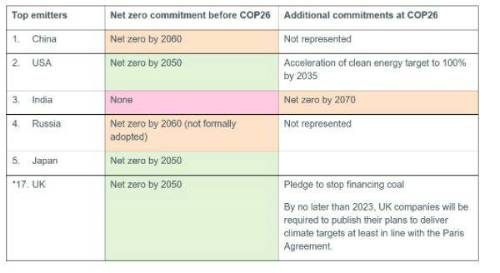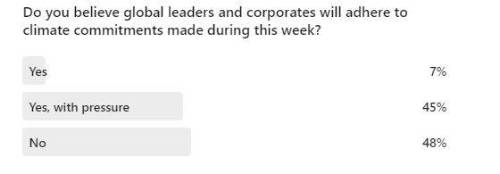 By Simon Jones, Head of Responsible Investment and Callum Stewart, Head of DC Investment at Hymans Robertson By Simon Jones, Head of Responsible Investment and Callum Stewart, Head of DC Investment at Hymans Robertson
With the latest Intergovernmental Panel on Climate Change (IPCC) report predicting the potential for a global temperature rise of 2.7 degrees by 2100, well behind the 1.5 degrees target set out in the Paris Agreement, COP26 has been viewed by many as an opportunity for global leaders to unite around the need for material action to address climate change.
Did the first week of the conference live up to this expectation? Please read on for our summary of the key events from the first week of COP26.
Some, but not all, of the world’s top carbon emitters have committed to taking action:

Source: Climate Action Tracker.
Perhaps most notably is the commitment from India to target net zero emissions by 2070. Although this target is later than required under the Paris Agreement, it is a significant step in the right direction given the nation is one of the world’s top carbon emitters. According to Thomas Hale, Oxford University, based on commitments made at COP26, over 90% of global GDP (and 84% of carbon emissions) is now covered by a net zero target. This signifies a material step forward.
Closer to home, Rishi Sunak announced that the UK will require companies listed on the London Stock Exchange to publish their plans for delivering net zero by no later than 2050, by 2023. Although further detail is required, one should expect this to signal a significant wave of action to address climate change in the UK.
Other commitments made during the week included:
Around $18bn pledged globally to assist with the transition from coal to clean energy;
28 countries joined an international alliance to phase out coal, but China, US and India did not commit;
The US, UK, France, Germany and the EU announced plans to fund South Africa’s transition away from coal;
Around 100 nations and parties signed a global pledge to cut methane emissions by 30% of 2020 levels by 2030;
A number of nations, including the UK, announced plans to tackle deforestation over the period to 2030;
African nations have committed to spending $6bn on adapting to climate impacts.
Was the first week of COP26 a success?
The IEA estimates that the various commitments made during the week could reduce global warming potential from 2.7 degrees to 1.8 degrees. Although this doesn’t quite reach the 1.5 degree target set out in the Paris Agreement, it would represent a strong step towards this goal, provided that those responsible adhere to these commitments.
What matters now is the action that countries take over the next few years to back up these actions. This means that politicians must put in place the necessary policies and regulations, and sell changes to local electorates.
Pessimism is in the air
Friday 5th November was Youth and Public Empowerment Day at COP26. Greta Thunberg suggested that 'our leaders are not leading' and casted doubt over the validity of commitments made during the week. The lack of representation from China and Russia has also been used widely as a symbol of failure at COP26.
We ran a quick LinkedIn poll to test confidence in global nations adhering to commitments during the first week of COP26. Here’s what they said:

Main takeaways
The first week of COP26, on the face of it, appears to have been positive, with more of the world covered by a net zero target and significant levels of capital committed to addressing climate issues. However, as ever, the rhetoric needs to back this up with quick and concerted action, with critics likely to be of the view that “we have been here before”. Those responsible for pension schemes will have an important role to play to make sure that their fund managers hold individual companies and entities to account relative to these higher standards, and be prepared to take action if efforts to progress don’t go far enough.
|


